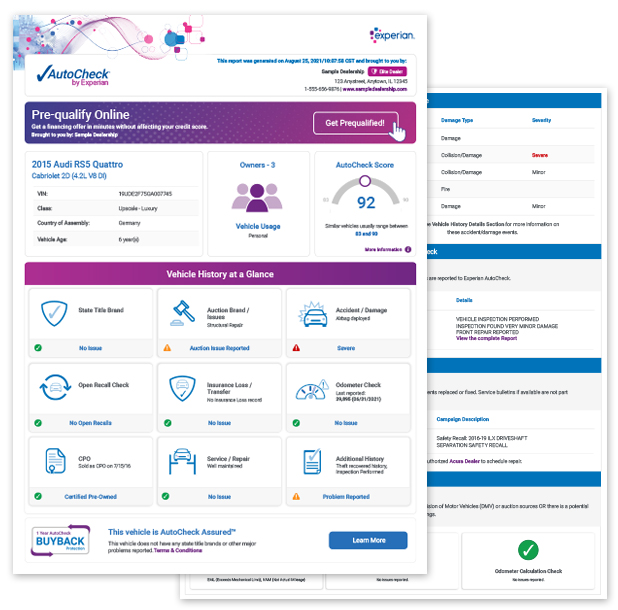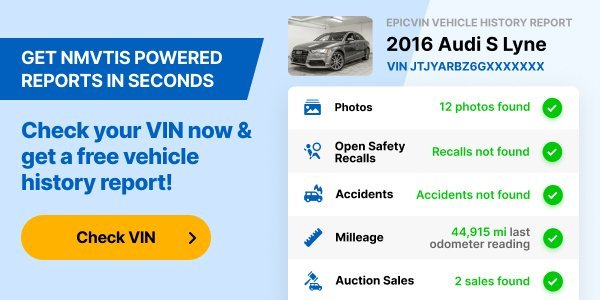Check a car’s history report, visit a reputable online service like Carfax or AutoCheck. Enter the vehicle’s VIN for detailed information.
Buying a used car can be daunting without knowing its history. A car’s history report provides crucial insights into past ownership, accidents, and maintenance records. This information helps in making an informed decision, ensuring you avoid potential issues down the road.
Use trusted services like Carfax or AutoCheck, which compile data from various sources, including DMV records, insurance companies, and repair shops. By simply entering the vehicle’s VIN, you get a comprehensive overview of its past. This step is essential in ensuring the vehicle’s reliability and value, giving you peace of mind in your purchase.
Gathering Vehicle Information
Before you check a car’s history report, gather key details. This ensures you get accurate information about the car’s past. The VIN and license plate are crucial.
Vin Number
The Vehicle Identification Number (VIN) is a unique code. It identifies each car. This number is like a car’s fingerprint.
You can find the VIN on the dashboard near the windshield. It is also on the driver’s side door frame. The VIN has 17 characters, including numbers and letters.
Here is a quick guide to locate the VIN:
- Dashboard near the windshield
- Driver’s side door frame
- Car’s registration documents
- Insurance papers
License Plate
The license plate is another important piece of information. It helps you track the car’s history. Note the plate number carefully.
Here are some places to find the license plate information:
- Front and back of the car
- Registration documents
- Insurance papers
Make sure the license plate matches the registration documents. This ensures you have the correct details.
Having both the VIN and license plate ensures a thorough history check. This helps you make an informed decision about the car.

Credit: vehiclehistory.bja.ojp.gov
Choosing A Report Service
When you decide to check a car’s history report, selecting the right service is crucial. Different services offer various levels of detail, accuracy, and cost. Knowing which one to choose can save you time and money. Here, we’ll explore popular services and the differences between free and paid reports.
Popular Services
There are several well-known services for checking a car’s history. These services provide comprehensive data about the vehicle. Here are some popular options:
- Carfax: Carfax is a trusted name. It offers detailed reports on a car’s history, including accidents and service records.
- AutoCheck: AutoCheck provides similar information. It also includes a unique score to compare cars.
- VINCheckPro: VINCheckPro offers a lower-cost alternative. It provides essential details like title history and odometer readings.
Free Vs Paid Reports
Choosing between free and paid reports depends on your needs. Free reports give basic information, while paid ones offer detailed insights. Here’s a comparison:
| Feature | Free Reports | Paid Reports |
|---|---|---|
| Accident History | Limited | Detailed |
| Odometer Readings | Basic | Comprehensive |
| Title Information | Minimal | Extensive |
| Service Records | Not Included | Included |
Free Reports are useful for a quick overview. They usually include basic title and accident data. These reports are good if you need only a general idea of the car’s history. But, they may lack critical details.
Paid Reports provide comprehensive details. These reports include accident history, service records, and odometer readings. They offer peace of mind by giving a complete picture of the car’s past. Investing in a paid report can save you from future issues.
Understanding History Report Details
The details in a car’s history report are crucial. It helps you make an informed purchase decision. This section will guide you through the essential parts of the report.
Accident History
The Accident History section reveals if the car has been in any accidents. Look for details such as:
- Date of the accident
- Type of accident (e.g., collision, fire, flood)
- Severity of damage
- Repairs done
Accidents can affect a car’s safety and value. Always consider the impact of past incidents.
Title Information
The Title Information section provides details about the car’s ownership history. It includes:
- Current title status
- Previous titles
- Odometer readings
- States where the car was registered
A clean title means the car is free of major issues. Look out for salvage or rebuilt titles. These indicate the car has had significant repairs.

Credit: www.autocheck.com
Checking For Odometer Fraud
Odometer fraud is a serious issue in the used car market. It involves tampering with the car’s odometer to show fewer miles. This can mislead buyers into thinking a car is in better shape than it is. Checking for odometer fraud is essential to avoid buying a problematic vehicle.
Signs Of Tampering
Look for signs of tampering around the odometer. A loose or crooked odometer may indicate tampering. Inspect the dashboard for any scratches or marks near the odometer. These could be signs that the odometer has been physically altered.
Check for inconsistent wear and tear. A car with low miles should not have excessive wear on the pedals or seats. Pay attention to these details as they can reveal a lot about the car’s true usage.
Odometer Discrepancies
Review the car’s maintenance records. These records often list the vehicle’s mileage at the time of service. Compare these records with the current odometer reading.
Use a vehicle history report to check for odometer discrepancies. These reports can show if there are inconsistent mileages reported over time. This is a strong indicator of potential odometer fraud.
Verify the mileage with the car’s title and registration documents. Any discrepancies between these documents and the odometer reading should raise red flags.
| Signs to Look For | Possible Indications |
|---|---|
| Loose or Crooked Odometer | Physical tampering |
| Scratches on Dashboard | Attempt to alter mileage |
| Inconsistent Wear and Tear | Higher actual mileage |
| Discrepancies in Maintenance Records | Odometer rollback |
| Inconsistent Title and Registration | Potential fraud |
By following these steps, you can protect yourself from odometer fraud. Always be vigilant and thorough when checking a car’s history.
Evaluating Maintenance Records
Evaluating maintenance records is crucial for understanding a car’s condition. These records provide insights into how well the car was maintained. Regular maintenance can extend a car’s lifespan and improve safety.
Service History
A car’s service history reveals its past care and repairs. Look for records of oil changes, tire rotations, and brake checks. Regular services indicate the car was well-maintained. Missing records may signal neglect.
| Service Type | Frequency | Importance |
|---|---|---|
| Oil Change | Every 3,000-5,000 miles | High |
| Tire Rotation | Every 6,000-8,000 miles | Medium |
| Brake Inspection | Every 10,000 miles | High |
Manufacturer Recalls
Manufacturer recalls address safety issues and defects. Check if the car has any open recalls. This ensures the car is safe to drive. You can find recall information on the manufacturer’s website.
- Check for open recalls.
- Verify recall repairs.
- Ensure all recalls are resolved.
Evaluating maintenance records helps you make an informed decision. A well-maintained car is a safer choice.
Identifying Previous Owners
Checking a car’s history report is essential. It helps you understand the car’s past. One crucial aspect is identifying previous owners. This information can reveal how well the car was maintained. It can also show if the car was frequently sold, which might indicate potential problems.
Owner Count
The owner count tells you how many people owned the car before. A car with fewer owners is usually more reliable. It may have been better-taken care of.
| Owner Count | Implication |
|---|---|
| 1-2 Owners | Likely well-maintained |
| 3-4 Owners | May have some issues |
| 5+ Owners | Potential frequent problems |
Types Of Previous Owners
The types of previous owners provide insight into the car’s use. Different owners may treat the car differently. Here are some common types of previous owners:
- Private Owners: Usually take good care of the car.
- Rental Companies: Cars may have higher mileage and wear.
- Leasing Companies: Often maintain cars well but use them heavily.
- Dealerships: Cars may be reconditioned before resale.
Identifying the type of previous owner can help you understand how the car was used. It can also indicate how well it was maintained.
Interpreting Salvage Titles
Understanding a car’s history report is crucial. One important aspect is the salvage title. This indicates significant damage. Knowing how to interpret this can save you money and trouble. Let’s dive into what it means.
What Is A Salvage Title?
A salvage title is given to a car after major damage. This means the car was in a severe accident, flood, or another event. The insurance company deemed it a total loss. The car is often repaired and sold at a lower price.
- Issued after severe damage
- Represents a total loss by insurance
- The car is repaired and resold
Risks Of Salvage Vehicles
Buying a salvage vehicle comes with risks. These cars might have hidden issues. Repairs might not meet safety standards. Here are some risks:
| Risk | Description |
|---|---|
| Hidden Damage | Repairs may hide underlying problems |
| Safety Concerns | Repairs might not meet safety standards |
| Resale Value | Salvage cars have lower resale value |
| Insurance Issues | Harder to insure, higher premiums |
Be cautious and always get a mechanic’s inspection. This can help you avoid unpleasant surprises and ensure the car is safe to drive.
Next Steps After Reviewing
After reviewing a car’s history report, it’s time to take the next steps. These steps ensure you make an informed decision. Let’s dive into what you need to do next.
Professional Inspection
Even if the history report looks clean, a professional inspection is crucial. A mechanic can spot hidden issues. This inspection might reveal problems not listed in the report.
Benefits of a Professional Inspection:
- Uncovers hidden mechanical issues
- Ensures the car is safe to drive
- Gives you peace of mind
Here’s a simple checklist for the inspection:
| Area | What to Check |
|---|---|
| Engine | Leaks, noises, performance |
| Brakes | Wear, function, fluid levels |
| Suspension | Shocks, struts, alignment |
| Interior | Upholstery, electronics, safety features |
Negotiating Price
Once the inspection is complete, you can negotiate the price. Use the report and inspection results as leverage. This can help you get a better deal.
Tips for Negotiating:
- Be polite but firm
- Highlight any issues found
- Know the car’s market value
- Set a maximum price you’re willing to pay
Here’s a handy tip: bring copies of the inspection report. Show these to the seller during negotiations.
Remember, knowledge is power. The more information you have, the better your negotiating position.

Credit: www.kbb.com
Frequently Asked Questions
What Is A Car History Report?
A car history report provides detailed information about a vehicle’s past, including accidents, ownership, and mileage.
Why Is Checking A Car’s History Important?
Checking a car’s history helps you avoid vehicles with hidden issues, ensuring a safer and smarter purchase.
How Can I Obtain A Car History Report?
You can obtain a car history report from services like Carfax, AutoCheck, or through the vehicle’s VIN.
What Information Does A Car History Report Include?
A car history report includes accident history, title status, mileage, ownership records, and sometimes maintenance logs.
Can I Check A Car’s History For Free?
Some websites offer limited free checks, but comprehensive reports usually require a fee.
How Reliable Are Car History Reports?
Car history reports are generally reliable but may not include unreported incidents or recent events. Always inspect the car personally.
Conclusion
Checking a car’s history report is essential before purchasing. It ensures you’re making a safe investment. Always use reliable sources to gather accurate information. A thorough history check can save you from future troubles. Stay informed and drive with peace of mind.
Your next car should be a wise choice.


